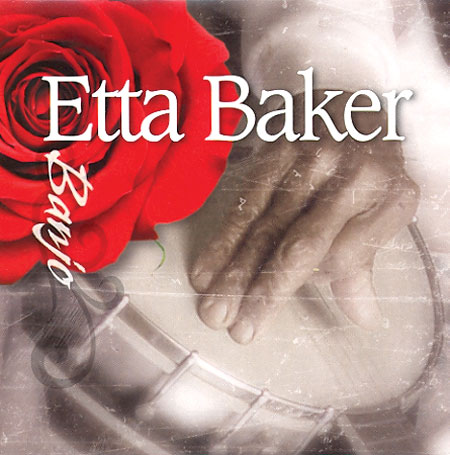Etta Lucille Reid
b. March 31st, 1913 in Caldwell (North Carolina)
d. September 23rd, 2006 in Fairfax (Virginia)

INSTRUMENTAL MUSIC OF THE SOUTHERN APPALACHIANS
Tradition
Summer 1956
Lors d'un voyage en Virginie et en Caroline du Nord, Paul Clayton, Diane Hamilton et Liam Clancy enregistrent une demi-douzaine de musiciens locaux. Dans la localité de Morganton, ils rencontrent Etta Baker qui joue de la guitare depuis ses 3 ans. Celle-ci grave, lors de la séance, cinq morceaux instrumentaux, repris d'airs traditionnels, techniquement parfaits. Son père banjoïste Boone Reid (79 ans à l'époque) est également présent sur cette anthologie pour deux morceaux avec sa fille. "Instrumental music of the southern appalachians" demeure un moment-clé dans le revival folk-blues en train de naitre et influença des artistes aussi importants que Bob Dylan ou Taj Mahal.
During a trip to Virginia and North Carolina, Paul Clayton, Diane Hamilton and Liam Clancy recorded a half-dozen local musicians. In the town of Morganton, they met Etta Baker playing guitar since she was 3. During those sessions, she recorded five instrumental pieces, taken from traditional tunes, technically perfect. Her father banjoist Boone Reid (79 years old at the time) is also present in this anthology on two tracks with his daughter. "Instrumental music of the southern Appalachians" remains a key moment in the new folk-blues revival and influenced many important artists such as Bob Dylan and Taj Mahal.

MUSIC FROM THE HILLS OF CALDWELL COUNTY
Physical
July 1972

CAROLINA BREAKDOWN
Music Maker
August 1988 - July 1990
Pris lors de séances captées entre 1988 et 1990, ce disque associe Etta Baker avec la banjoïste Cora Phillips. Un album édité par l'association Music Maker qui reste un sympathique témoignage du talent d'Etta bien qu'il ne figure pas parmi ses meilleurs enregistrements.
Captured between 1988 and 1990 sessions, this record combines Etta Baker with banjoist Cora Phillips. Edited by the Music Maker Association, this album remains a sympathetic way to hear Etta's music although it is not among her best recordings.

ONE DIME BLUES
Rounder
October 1988 - August 1990
Ce disque pour Rounder produit par Wayne Martin et Lesley Williams est, en réalité, le premier album d'Etta James (puisque les séances qui constituent "Carolina breakdown"seront éditées beaucoup plus tard par Music Maker). Sa remarquable technique de fingerpicking à deux ou trois doigts est, ici, parfaitement mise en valeur. Comme d'habitude, elle se plait à interpréter des pièces entre Piedmont Blues et airs folk traditionnels. Si les disques publiés par l'association Music Maker sont tous intéressants, ce "One-dime blues" demeure son effort discographique le plus abouti.
This album for Rounder, produced by Wayne Martin and Lesley Williams, is actually the first Etta Baker album (since the sessions of "Carolina breakdown" will be published much later by Music Maker). Her remarkable fingerpicking technique with two or three fingers is here perfectly rendered. As usual, she likes to interpret tunes between Piedmont blues and traditional folk. If Music Maker albums are all interesting, this "One-dime blues" remains her best.

RAILROAD BILL
Cello
Music Maker
May 1995 - June 1998

ETTA BAKER WITH TAJ MAHAL
Music Maker
May 1995 - June 1998
En réalité, il n'y a qu'un tiers des morceaux ou Etta est associée à Taj Mahal. On trouve aussi un duo avec le violoniste Wayne Martin et un autre avec Algia Mae Hinton ("Comb blues"). Parmi les morceaux avec Taj Mahal, on retient une curiosité "Madison street blues" joué à la guitare électrique. Etta montre aussi qu'elle était une banjoïste de talent dans sa reprise de "Cripple creek". L'ensemble de la musique présentée ici est intrumentale (comme d'habitude chez cette artiste) sauf dans l'éphémère "Poem" dans lequel on entend le son de sa voix. A la fin du disque sont ajoutés ses sept morceaux de 1956 (cinq sous son nom et deux ou elle accompagne son père Boone Reid). Au final, ce disque très varié dresse un très bon panorama de cette superbe artiste.
In fact, there is only one third of the tracks where Etta is associated with Taj Mahal. There is also a duet with violinist Wayne Martin and another with Algia Mae Hinton ("Comb blues"). Among the songs with Taj Mahal, one curiosity "Madison street blues" is played on electric guitar. Etta also shows that she was a talented banjo player in her cover of "Cripple Creek". All music presented here is instrumental (as usual with this artist) except in the ephemeral "Poem" in which we can hear the sound of her voice. At the end of the album are added seven pieces of 1956 (five under her name and two others in which she accompanied her father Boone Reid). In the end, a very interesting overview of this superb artist.

BANJO
Music Maker
?


LAST AND LOST BLUES SURVIVORS
Music Maker
SISTERS OF THE SOUTH
Music Maker
?
L'association Music Maker a fait paraitre ces sublimes anthologies en 2005 et 2008 pour mettre à l'honneur les femmes et les hommes du blues qui ne vivent pas de leur musique. Dans le premier recueil, on retrouve un morceau d'Etta Baker intitulé "Johnson boys" ou elle est au banjo. Dans le second, consacré uniquement aux femmes, elle apparait sur huit pistes. Certains sont des enregistrements originaux, d'autres sont des reprises de son disque avec Taj Mahal.
Music Maker association published these superb anthologies in 2005 and 2008 to honor obscure men and women of the blues who do not make a living with their music. In the first installment, there is a track of Etta Baker entitled "Johnson boys" where she plays banjo. In the second one, dedicated solely to blues women, she appears on eight tracks. Some are original recordings, others are taken from her album with Taj Mahal.
Thanks to Aaron Greenhood and Mary Anne Tatum from Music Maker Relief Foundation